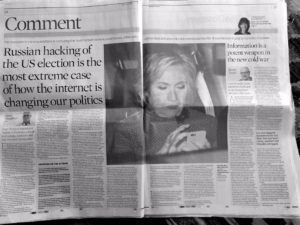This morning’s Observer column:
If there were a Nobel prize for hypocrisy, then its first recipient ought to be Mark Zuckerberg, the Facebook boss. On 23 August, all his 1.7 billion users were greeted by this message: “Celebrating 25 years of connecting people. The web opened up to the world 25 years ago today! We thank Sir Tim Berners-Lee and other internet pioneers for making the world more open and connected.”
Aw, isn’t that nice? From one “pioneer” to another. What a pity, then, that it is a combination of bullshit and hypocrisy. In relation to the former, the guy who invented the web, Tim Berners-Lee, is as mystified by this “anniversary” as everyone else. “Who on earth made up 23 August?” he asked on Twitter. Good question. In fact, as the Guardian pointed out: “If Facebook had asked Berners-Lee, he’d probably have told them what he’s been telling people for years: the web’s 25th birthday already happened, two years ago.”
“In 1989, I delivered a proposal to Cern for the system that went on to become the worldwide web,” he wrote in 2014. It was that year, not this one, that he said we should celebrate as the web’s 25th birthday.
It’s not the inaccuracy that grates, however, but the hypocrisy. Zuckerberg thanks Berners-Lee for “making the world more open and connected”. So do I. What Zuck conveniently omits to mention, though, is that he is embarked upon a commercial project whose sole aim is to make the world more “connected” but less open. Facebook is what we used to call a “walled garden” and now call a silo: a controlled space in which people are allowed to do things that will amuse them while enabling Facebook to monetise their data trails. One network to rule them all. If you wanted a vision of the opposite of the open web, then Facebook is it..
Read on.

